#steven meretzky
Explore tagged Tumblr posts
Text


Developed/Published by: Infocom Released: 22/08/1986 Completed: 18/04/2025 Completion: Completed it. 304/304 points (though points are random and I believe you get them all just in the process of beating the game.)
Phworr, eh lads? Etc.
Right, that’s me got all the 90’s video game magazine parlance out of the way [“you forgot ‘or something’ and to do a made-up Ed’s note”–made-up Ed.] so I can put my “pretending to be a serious games historian” hat on for the first Infocom game I’ve played since Trinity–surprisingly, all the way back in 2023. If you’ve been following along, you’ll be aware I’ve been picking and choosing Infocom games to play through, leaning towards the work of Steven Meretzky, and I’ve been looking forward to playing this for a while, his “return” to a more normal sort of adventure game after the big swing (and commercial miss) of A Mind Forever Voyaging.
Based on a joke title Meretzky posted on a whiteboard featuring upcoming releases for Infocom, Leather Goddesses of Phobos is a strange release, I think. Infocom had always made games for adults, but never “adult” games, and there hadn’t really been any commercial “adult” games for years at this point. Softporn Adventure came out in 1981, and unless you’re Portuguese and have fond memories of Paradise Cafe for ZX Spectrum that was about your lot. So it seems like quite a gamble for Infocom to release something that appears so risque–but then Leather Goddesses of Phobos isn’t really an adult game at all. In fact, it’s barely smutty at its most extreme, and Meretzky, wanting to drum up a bit of controversy after the failure of an anti-Reaganite art game, decided “sex sells” and Infocom as a group went for it: digging through Meretzky’s papers, he sent a sheet of possible game ideas to the other imps (this may have been the standard procedure at Infocom?) for his next game, and Leather Goddesses of Phobos won out, where its sexual content was expressed as “very soft-core; see Barbarella as an example.” (it doesn’t even go that far, to my eyes.)
(The sheet is quite illuminating in general, a kind of ideation that I recognise as a game developer. We have another attempt, I think, to court a bit of controversy with “The Interactive Bible”, an interesting if not-yet-fully-baked design idea “Blazing Parsers” and then something that’s optimistically trying to make making a game quicker, “The Viable Idea.” Personally, I’m sad we never saw an Infocom spaghetti western.)
Unlike some other Infocom releases, I don’t really have any personal history with Leather Goddesses of Phobos outside of memories of the (very) mildly titillating screenshots of its sequel, Gas Pump Girls Meet the Pulsating Inconvenience from Planet X! In fact, the main thing I have to say is that I only realised this wasn’t called “Leather Goddess of Phobos” after playing it for a bit, which won’t make me cry “Mandela Effect” as much as “Goddesses is such an inelegant word, it’s bizarre it isn’t just Leather Goddess. My brain was correct, reality wasn’t.”
But anyway, what is it actually like to play Leather Goddess(es) of Phobos?
I’ve been a bit up and down on the Infocom games I’ve played–some might say unnecessarily hard on them, judging them by the coddled standards of 2025. But Leather Goddesses of Phobos gets off to a good start. Unlike Trinity, where you essentially never know what you’re actually trying to do overall, Leather Goddesses of Phobos more or less immediately has a character hand you a laundry list of items to collect, and then you go “oh, I guess I just have to collect these, then.”
As good as that is, it’s also a little… underwhelming. Having picked and chosen, I’m aware that I’ve not seen everything that Infocom has to offer, but I’m still surprised that I haven’t played an Infocom game since Deadline (their third game) that gave me any sense of anything except a static world. Leather Goddesses of Phobos gives you a Floyd-like companion (Trent, or Tiffany) but they barely seem to exist, and even when you meet characters in the world they feel so… un-interactive. Maybe, at best, they take part in a little vignette.
I suppose with Leather Goddesses of Phobos I’m really realising–and perhaps chafing against–the limitations of the text adventure at least in the mid-1980s. In some respects, you want a text adventure to have the feeling of a book; limitless, enveloping imagination. But in other respects, you want to play it like a game. You want to be reacted to. It’s probably, why, to be honest, characters have been so sparse in these games–because when you try and interact with a character, and they don’t do anything, or it feels wrong, the illusion of being on an adventure is broken. You’re not reading a book, you’re on a dark ride and suddenly the lights slam on and you’re aware you’re looking at a mannequin, not the king of Mars.
Somehow, the fact that characters in Deadline might like… walk into another room just abated that, and I’m not asking for characters to roam across the planet here, but maybe if they piped up a bit more. Felt a bit more worth talking to. The issue with making a “funny” game is that so much of comedy is character work, and here, really, the only character is the parser.
But I’m being a bit harsh, because Leather Goddesses of Phobos is otherwise an extremely solid classic rooms and items, bread and butter text adventure. The best I’ve played since Meretsky’s own Planetfall, and arguably the best I’ve played full stop. It’s understandable, accessible, and I never had to use an Invisiclue to the point where it just told me what to do–well, except in one particular case.
That one I’m just going to spoil, actually. One of the things that makes Leather Goddesses of Phobos work so well is how well integrated the feelies are. Sure, I don’t have the box to hand, but there’s a comic which includes a couple of direct hints for some puzzles, a map which is unbelievably necessary and helpful, and a scratch and sniff card, which I’m sure nearly 40 years later is completely useless even if you opened a brand new box, but which is a really cute and silly B movie-adjacent idea that’s perfectly fitting. One of the things it does is prompt you to “smell” things in the game to work out what they are (which it thankfully tells you in text–scratch and sniff cards have always barely worked). Early in the game (for me–the game is fairly open ended) you sniff and discover some chocolate, which, of course, you’ll hang on to. Later, for reasons, your mind will be transferred into a gorilla. But you’re not strong enough to break out of the cage. I assume you can see where this is going: you need to eat the chocolate to get strong enough to break out of the cage.
You know, that famous thing about gorillas. That chocolate makes them strong.
This is, obviously, nonsense. The only animal-related fact I know about chocolate is that it kills dogs and I certainly wasn’t hanging onto it in the game expecting I’d use it to kill a poodle or something [“you said ‘or something’ after all”–90s Ed.] Considering that banana is one of the most recognisable smells you could possibly use on a scratch-and-sniff card, I had to assume that Meretsky simply thought that giving you a banana would be too obvious a solution so went with the impossible to work out chocolate, but I couldn’t find anything in his notes to reflect that. According to the ever reliable Digital Antiquarian, Meretsky tested the scratch and sniff scents on the other imps to select the most recognisable scents to then use in the game, and I do think it adds insult to injury that one of those chosen scents actually was banana! But it’s used elsewhere!!!
I even found a playtester who complained about this exact puzzle:
“It is reasonable to not eat the chocolate and even suspect the sugar rush, but why oh why would you put the chocolate in the cage?”
I suppose he’s more complaining that this game features more than one puzzle which requires hindsight, and to be honest, they should have fixed those too. But in general, Leather Goddess of Phobos is logical and fair, while still managing to make puzzles funny and clever–the best of The Hitchiker’s Guide To The Galaxy without the worst of it. There’s a puzzle about kissing a frog that will immediately put you in mind of the famous babel fish (and which made me laugh out loud) and a puzzle involving a mysterious machine and wordplay that is so perfect and silly that it’s maybe one of my favourite things in an adventure game ever–possibly worth the price of admission alone.
The game does still undercut itself though–for seemingly no reason. There are definitely ways to manufacture yourself a no-win, dead man-walking situation, for example, all of which I miraculously managed to dodge due to the order I did things in, and I definitely had a few puzzles where by all rights I was just lucky to not have to resort to clues. One object on your list you need to specifically look somewhere you might not look to find, and then you need to be really specific with the parser to do what you need to do to get it. Another requires a vignette that you need to be in time for (though that one I immediately sussed what was up–the “dead end” was just so suspicious to me. But I reached it almost at the end of the game–if I’d got there early, I could have had to replay nearly the entire game.)
The game’s maze–which people find famously annoying–is a perfect example of how the game undercuts itself. You have the map in hand. You have the required clue. If you’re patient, it’s actually really satisfying to navigate it, and I did so… and then the torch I was using burned out, and I had to do the whole thing again much more efficiently. Close to hundreds of turns. It was so unnecessary! I was having fun!!! Why punish me for not being perfect!!!
These moments, however, are far rarer than you’d expect. I noted above that the game is fairly open ended, and I’m not sure if there’s a “preferred” way to work through the game, but as I said above in my playthrough I never entered a vignette where I didn’t have something to hand I needed (though it’s possible, I’m sure) and if I got stuck somewhere there was always somewhere else to go for me to solve something else. I never put this down annoyed–well, apart from the fucking maze. Well, not the fucking maze–the fucking torch (I honestly did think the maze was clever.)
I think the thing about Leather Goddesses of Phobos is… it’s probably as good as one of these things is going to get without a much more modern design philosophy. You know what you need to do and every time you sit down and play it you get a little closer to doing it–and it’s charming while you do it. But it’s never sexy. I did play it on the “LEWD” setting and took every opportunity for a bonk, because I’m still thirteen at heart, but my dander remained unfrothed; it doesn’t even reach the heights of Alter Ego! I guess I’ll see how I get on with [checks to-play list] Leisure Suit Larry??? Eugh!
Will I ever play it again? You know, it’s possible. It’s not likely, but it’s possible. And I will play Gas Pump Girls Meet the Pulsating Inconvenience from Planet X!, which I don’t believe anyone likes. Because why not.
Final Thought: In some respects, Leather Goddesses of Phobos suffers for not being something special like A Mind Forever Voyaging, but it also sort of is, as the last true success Infocom would release before the company began an unstoppable slide into oblivion, and for that alone it should be celebrated. At the very least, if you like text adventures, though, you know how to play them, and you can live with the idea you might have to reload a save on occasion, this is a solid couple of tevenings. Oh sorry, I mistyped… tevenings. There must be a mysterious machine around here somewhere for that…
Enjoyed this post? It was originally published at exp. Magazine, a user-supported website. Support us by subscribing at Patreon, buying us a coffee via Ko-fi, or just subscribing to our newsletter.
0 notes
Text
Game Pile: Leather Goddesses of Phobos
Game Pile: Leather Goddesses of Phobos
Leather Goddesses of Phobos is a 1986 text adventure videogame, produced by Infocom, written by Steven Meretzky, and it exists entirely because of a whiteboard joke that nobody in the room said ‘hey, maybe let’s just not?’ to enough times. In this 1930s schlock sci-fi inspired ‘sex farce’ game, you get to explore locations like Mars, Venus, and Cleveland. It was, ostensibly, one of a small number…

View On WordPress
5 notes
·
View notes
Text
Long Lost ‘Zork’ Source Code Uploaded to GitHub, But Few People Understand It
In 1977, four members of MIT’s Laboratory for Computer Science Dynamic Modeling System started writing a seminal work of interactive fiction. Published later in three parts by Infocom, Zork (along with Zork II and Zork III) is one of the earliest text adventure games, and the start of Infocom’s legacy in interactive fiction. The games told stories using a choose-your-own-adventure style. You reach the end of a hallway. Which way do you choose? The player types their answer to continue the story. But beyond simple commands, Infocom’s games were able to understand more complex sentences, which gave it a depth other games of the era didn’t have.
Infocom was eventually bought out by Activision in 1986, but was quickly shut down a few years later. There are more modern collections of Infocom games available, keeping the spirit of Zork alive, but the source code, which could teach us how Infocom managed to create such a sophisticated game at the time, had been deemed lost. That is, until this week, when internet archivist Jason Scott uploaded a collection of all Infocom text adventures and interactive fiction games’ source codes to GitHub, including the Zork games and Infocom’s video game adaptation of The Hitchhiker’s Guide to the Galaxy.
“They are the source coded and formulas to make some of the best-selling computer games of the 1980s,” Scott told Motherboard. “Infocom games were always in the top 10 for years, and well-regarded at the time.”
But while source code is historically significant, few people will understand how it actually works.
All of Infocom’s games were created using the Zork Implementation Language (ZIL), which is based on another old programming language called MIT Design Language (MDL), which itself was based on a the programming language Lisp.
“[ZIL] is written to create adventure games in an environment people haven’t used commercially in over 25 years,” Scott said. “And even then, it was about 15 people.”
Most people will probably parse through the code at a surface level, with “a passing interest in seeing how the adventure games they played as kids were defined by this code,” Scott added. But for a niche group of programmers, it’s a collection of information that’ll propel their research forward. The “ZIL – Zork Implementation Language” Facebook group, created two years ago by ZIL enthusiasts Jesse McGrew and Adam Sommerfield, has been teaching and supporting the language, but has struggled to find original ZIL source code to use as a reference. Sommerfield told Motherboard that for the ZIL and text adventure communities, the source code files are a huge discovery for enthusiasts.
“Aside from the historical value in being finally able to look at the code, understand the thought process, [and] maybe even get a glimpse into the minds of the Imps—Infocom Implementers—you have the fact that resources and reference material for learning ZIL has received a massive shot in the arm,” Sommerfield said.
Infocom developer and one of the MIT students who created Zork Dave Lebling is part of the Facebook group, too, Sommerfield said, and sometimes “provides guidance” to users. Steven Meretzky, another Infocom developer, has also reached out in support, thanking the group for “keeping the [ZIL] torch lit.”
Using a compiler created by McGrew, the ZIL Facebook group is now testing the code—and it’s working. One user has got all three Zork games to compile. This leaves things open for ZIL enthusiasts to tinker with the code and test it in-real time, packing on additions and modding existing games. But the licenses here are tricky; Scott noted that these were given to him anonymously and “not considered to be under an open license,” he wrote in the repository notes. That’s because Activision owns the IP.
Scott had previously uploaded “a collection of digitized scans from a large cache of documents” in 2015 related to Infocom, “The Infocom Cabinet.” It’s got notes, journal entries, and forms collected by Meretzky. In 2017, Scott published Infocom: The Documentary on YouTube. But the preservation of the source code is key in documenting the historical importance of these games. “Ten years ago I was handed the image of a development hard drive for Infocom,” Scott said. “It was thought this was all lost, but obviously, it wasn’t.”
Scott wrote in the GitHub documents that the files “represent a snapshot of the Infocom development system at time of shutdown,” but that there’s no way to compare the files available to the official games, which means the source code files are “canonical, but not necessarily the exact source code arrangement for production.”
“This collection is meant for education, discussion, and historical work, allowing researchers and students to study how code was made for these interactive fiction games and how the system dealt with input and processing,” Scott wrote.
But for those only interested in browsing the source files, there’s stuff in there for you, too. Scott told Motherboard that Infocom enthusiasts will enjoy peeking at the in-jokes typed into the code—”Game over is listed as JIGS-UP,” Scott mentioned—and to relive each game’s puzzles and variables, parsing the built-in secrets of their designs.
Long Lost ‘Zork’ Source Code Uploaded to GitHub, But Few People Understand It syndicated from https://triviaqaweb.wordpress.com/feed/
0 notes
Text
Wasted day. Wasted life. Dessert, please.
Steven Meretzky
26 notes
·
View notes
Quote
Parallel universe. Bush, destitute, joins army.
Steven Meretzky
5 notes
·
View notes
Quote
Muy confundido, leyó su propio obituario.
Steven Meretzky
2 notes
·
View notes
Text

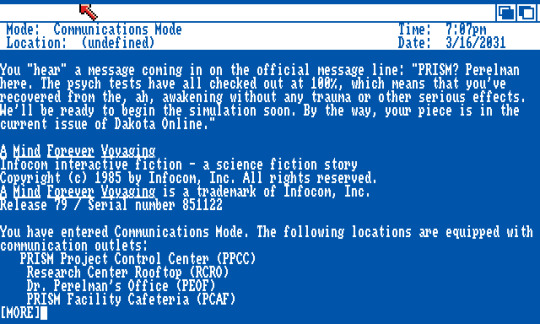
A Mind Forever Voyaging (PC)
Developed/Published by: Infocom Released: 14/8/1985 Completed: 17/11/2022 Completion: Finished it. Trophies / Achievements: n/a [Apologies for interrupting, but before we get to the article I'd like to mention that you can pre-order a copy of exp. 2600, my brand new zine, right now and get more of–and help support–writing like what you're about to read. Unless I've put you off, but this is a good one so I hope not.]
Do you have any famous works that you’ve always been… scared to start? I don’t mean intimidated–I haven’t read say, Infinite Jest not because it’s long, but because [jerk-off motion]–but that something is talked of in such hushed breaths that you’re worried it just won’t live up to whatever you might have imagined?
I have it a lot, and because I generally try to read as little as possible about things before I experience them, it’s not so much that I’m imagining these incredible things, as much as there’s this astonishing possibility space out there that it almost feels… wrong to cut it down to just the one thing. Schrodingers’ video game.
For A Mind Forever Voyaging, all I’ve known until now is its striking cover art, and that it’s Steven Meretzky’s attempt to grapple with Regan’s then-recent re-election by landslide. So it was with some trepidation that I started pouring over the box, feelies and manual.
The manual is worth reading, with the most empathetic piece of writing I’ve experienced by 1985 in video games, as we’re introduced to the game’s central concept: you, the player, are “PRISM” who, raised in a perfect simulation believing themselves to be the real person Perry Simm, discovers that, well, no, they’re actually just an AI.
It gave me enough pause that I actually put the game down and didn’t start it for several more weeks! If anything, the possibility space had got larger.
A Mind Forever Voyaging, now I’ve played it, is kind of a hard one to discuss. On hand, it’s flawed. As deeply flawed as any Infocom I’ve played up to this point has been, and for many of the same reasons. On the other, it’s a genuinely captivating piece of speculative (interactive) fiction that will probably stick with me forever, not least because while it might over-extend itself on specifics, politically and thematically it is one hundred percent correct.
Let’s get to those specifics. First up, the game really requires you to read the manual. While it’s nothing as complicated as Suspended (which I still can’t believe was only Infocom’s sixth game) there’s a similar sort of “mode switching” as you begin not able to walk about and pick up stuff but can simply switch between locations in communication mode (largely able to just see the same locations, or veg out and watch the news) or read backstory in library mode. It’s really here that you get to what could be considered the game’s most major flaw–how self directed the player has to be for most of the time.
This isn’t the same as something like Planetfall, where the player is primed “you’re stuck on this planet bro” it’s actually literally like “you’re a computer and there’s nothing to do?”
There are big swathes of this game where you’re stuck typing “wait” or even resorting to “wait 120 minutes” which I found almost… shocking. It’s made all the more baffling by the fact that the game has a news network that you can “watch” but when you’re in the mode time passes at a crawl, meaning that you’ll probably burn through basically the entire thing (hundreds of lines of script) just waiting to get to the first simulation!
The meat of the game is in that simulation, however, and this was a massive surprise to me. The game presents what is pretty much the only direction the player gets–that as PRISM, you’re supposed to do a lot of very mundane things in a simulation of a small town, Rockvil, ten years in the future, like eat in a restaurant and speak to a clergyman–record them, and then deliver the recordings to see if the government’s transparently republic agenda known as “the plan” will work. It’s here the game takes a massive diversion from what I’d expect from a Infocom game at this point, because you enter a genuinely huge recreation of a town that is nigh-unmappable, with hundreds of rooms and most rooms having as many exits as there are compass points.
Don’t get me wrong, this is a meticulous recreation of a town and is an extremely intentionally designed space, but it’s also not a “designed space” as any video game developer would know it now. I quickly gave up any pretense of mapping the space–relying on the one decent map I could find online–and began wandering.
And wander I did. To be honest, you don’t genuinely need a map outside of the one that comes in the manual, as you aren’t really needing to hunt anything out. As has been written elsewhere, in A Mind Forever Voyaging, you are an observer, not an active participant, and as a result, simply wandering as your wont takes you and recording what you find interesting or pertinent is genuinely enough to progress.
Of course, that’s as long as you understand that, because once you’ve managed to “complete” the tutorial-like first simulation, the game literally goes “oh, we don’t have anything for you to do now. Entertain yourself.”
I know that it’s easy to accuse modern players of wanting everything on a silver platter (or at least, with a silver arrow pointing in the direction of the platter) but I really do find it hard to believe that even players in 1985 didn’t find this kind of thing frustrating. Noodle around long enough, and you’ll work out that you can get to a simulation twenty years in the future. But what do to there? Might as well just record the same stuff you did ten years in the future, right?
And it’s here we hit what is–confusingly–A Mind Forever Voyaging’s most glaring flaw but also what might be the thing about it that makes it the most memorable. For the majority of the game all you do is revisit Rockvil and record how it changes across the years. It’s repetitive, and by the fifth time you do it you are almost certainly tired of the same interactions.
But it’s also a perfect experience in seeing the slow decline of society under rule by Republican values. In 1985, this was just a scary warning of how the future could look. In 2022, it’s a sharp shock to the player, showing them how much has been lost and how much more will be lost if we continue the way we have. It is too easy to experience the decline of our civilization as a frog, slowly boiling, and A Mind Forever Voyaging asks you to remember what temperature the water actually is.
As Steven Meretzky noted in 2017, everything came true. The game features a border force who act as judge, jury and executioner; viciously racist policing, and the complete MAGA-fication of politics long before anyone even imagined such a thing. Even the things that seem far fetched in the moment–a supreme court giving the ok to religious fundamentalists seizing government property?–doesn’t seem that absurd when you ask “could the current supreme court have sided with the far-right extremists in the Occupation of the Malheur National Wildlife Refuge?” the answer is yes, obviously yes.
And isn’t it disturbing that you’ve probably already forgotten about it?
It is painful, genuinely painful at points, to be playing a game that shows horrible things happening in a decade to represent a society that is past the point of no return and recognise that these things are already happening around us. That Meretzky was far too kind to expect things to not have gone to totally hell until 2050 at the earliest.
To be honest, a game like A Mind Forever Voyaging is as vital now as it’s ever been, and while I can’t recommend it without caveats, I actually rather like that I’m not completely certain that my instincts on its subtler “flaws” are correct or not. Lack of direction and the need to endlessly wait at points? Yeah, those are bad. But I can’t decide if choosing to create a huge, often samey and empty Rockvil is actually worse than making something more tightly designed. Rockvil might feel more real to me because I had to traipse through several parking empty parking lots; I can’t tell if it’s an acceptable price to pay that so many descriptions are generic (I got tired of things being described as a “totally ordinary [noun]”). Wouldn’t it be more interesting to have puzzles to solve? Like, shouldn’t I have to steal a ration card to make the ration card fraud arrest happen so I can record it? Or would the ludic nature of that undo that sense that Rockvil is real, and I’m genuinely experiencing it?
With modern eyes, I think I would prefer the latter (tighter, have some puzzles) but I don’t actually blame Meretzky for going the other direction at all–especially considering the one puzzle in the game (avoiding being killed in act 3) involves, annoyingly, having to wait (again!) in the right place at the right time to even notice what’s going on (I really don’t know what the hell was going on with Infocom’s playtesters sometimes.) But the only thing I really don’t think works in the game is the saccharine epilogue. The digital antiquarian goes into probably too much detail on it, but he successfully raises that A Mind Forever Voyaging’s setting, movingly portrayed or not, doesn’t make a ton of sense if you go one level down, and ultimately only serves as backdrop for a polemic, which would ring more true I think without the San Junipero wish-fufillment. There’s no guarantees a utopia awaits if we do the right thing now. It requires constant vigilance.
(And I have to agree that casting Perry Simm as mere observer does him a disservice–memory was at a premium even with a new extended Z-Machine interpreter allowing 128k instead of 64k to fit the game into, but that the game’s descriptions are often so dispassionate, and we never see or experience Simm grapple with his new existence as an AI is a disappointment. But A Mind Forever Voyaging is already doing so much, probably too much.)
So after all that, how do I feel now that A Mind Forever Voyaging is the thing that it is, rather than whatever I imagined it could be? Incredible, honestly. I’m richer for having played it, warts and all.
Will I ever play it again? It’s an interesting question. I’m not sure I’d choose to play it again–the slow decline of society is… slow. However, it’s a game I would relish showing to others.
Final Thought: Late summer/early autumn in 1985 was insane. A Mind Forever Voyaging was quickly followed by Super Mario Bros. in September and that was followed by Ultima IV days later. Hard to argue that these three don’t represent in many ways the peak of creativity in video games even now.
Support Every Game I’ve Finished on ko-fi, either via a one-off donation (pay what you like) or by joining as a supporter at just $1 a month. Supporters receive an automatic 35% discount off physical zines, like exp. 2600, which you can order now.
9 notes
·
View notes
Photo
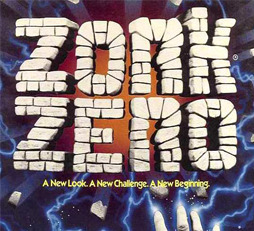

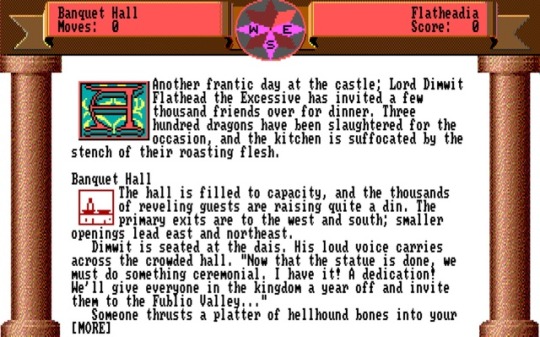
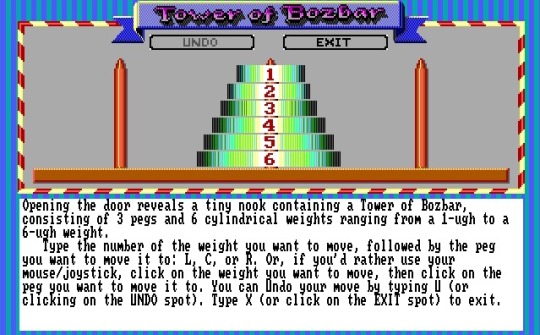
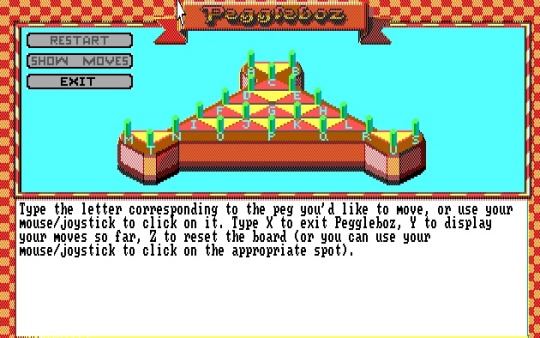
Game Review: Zork Zero
By Steve Meretzky, Infocom (1989)
At the outset, I should confess -- I did not beat this game. The story has you exploring the nearly abandoned castle of the former Flathead dynasty. You must find 24 special objects, place them in a cauldron, and utter the magic words to lift the spell that hangs over the castle. The objects are pretty random: a metronome, a dumbbell, a T-square, etc. And there are a massive number of other objects you will need to solve the game’s puzzles. That is a lot of object management to deal with -- carrying objects back and forth, never knowing which random thing might be needed later on, but of course you aren’t able to carry them all at once. And the game is LONG, and it requires so, so, so much travelling. A clever game device does involve the use of a magic pigeon which can transport you back to places where you have left its perch. This doesn’t just save time, but it’s also part of some puzzles which send you to places which otherwise have no return route.
This game is also hard. Very, very hard. It has both the usual Zork-type puzzles, where a scenario must be managed with the right objects and phrases, as well as self-contained logic puzzles which are illustrated with graphic screens. These puzzles are significantly easier, since you’ve probably played them already as a kid: the Tower of Hanoi, a river-crossing puzzle, Nim, a peg game like the one they have on the tables at Cracker Barrel. Despite the very challenging nature of the gameplay, I was really drawn into the game. The text parser is excellent, so rarely was the challenge caused by syntax guessing. And the game is very funny -- Meretzky was definitely in top snarky form. Nevertheless, when I got to the very end, I must have missed one of the objects, perhaps due to not organizing my save points well enough (because you will be saving and restoring a LOT). And the game had already sucked up so much of my life, I just couldn’t stomach going back and playing through it again. But despite my own failure, it was a good ride, and I give this game 8/10.
#zork zero#game review#infocom#steve meretzky#steven meretzky#text-based game#text game#text based game#interactive fiction
1 note
·
View note
Photo

The 1984 fourth Zork book, Conquest at Quendor, a choose-your-own-adventure by Steven Eric Meretzky
1 note
·
View note
Quote
He read his obituary with confusion.
Steven Meretzky
4 notes
·
View notes
Quote
Wasted day. Wasted life. Dessert, please.
Steven Meretzky
3 notes
·
View notes
Quote
Dorothy: "Fuck it, I'll stay here."
Steven Meretzky
2 notes
·
View notes